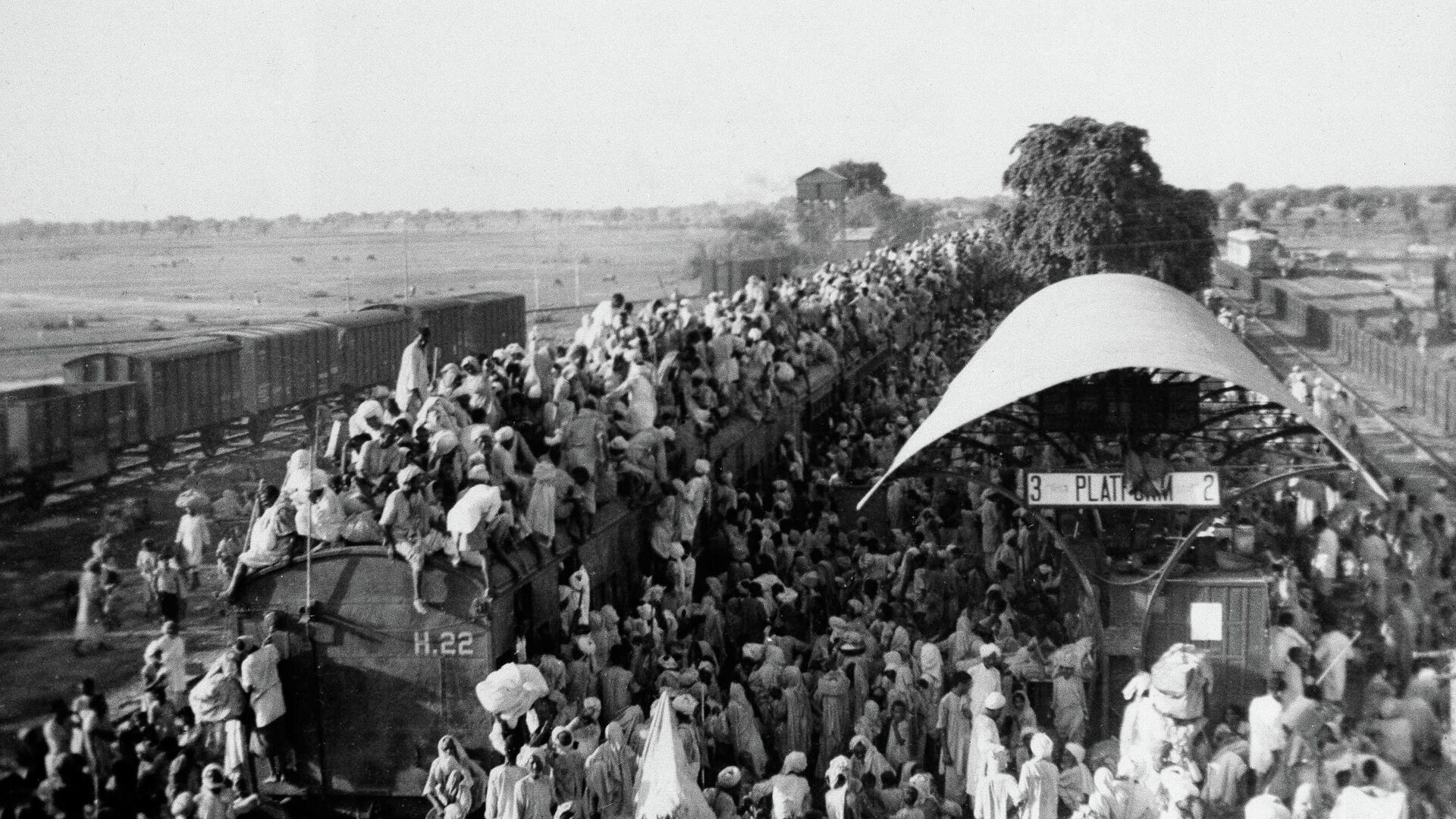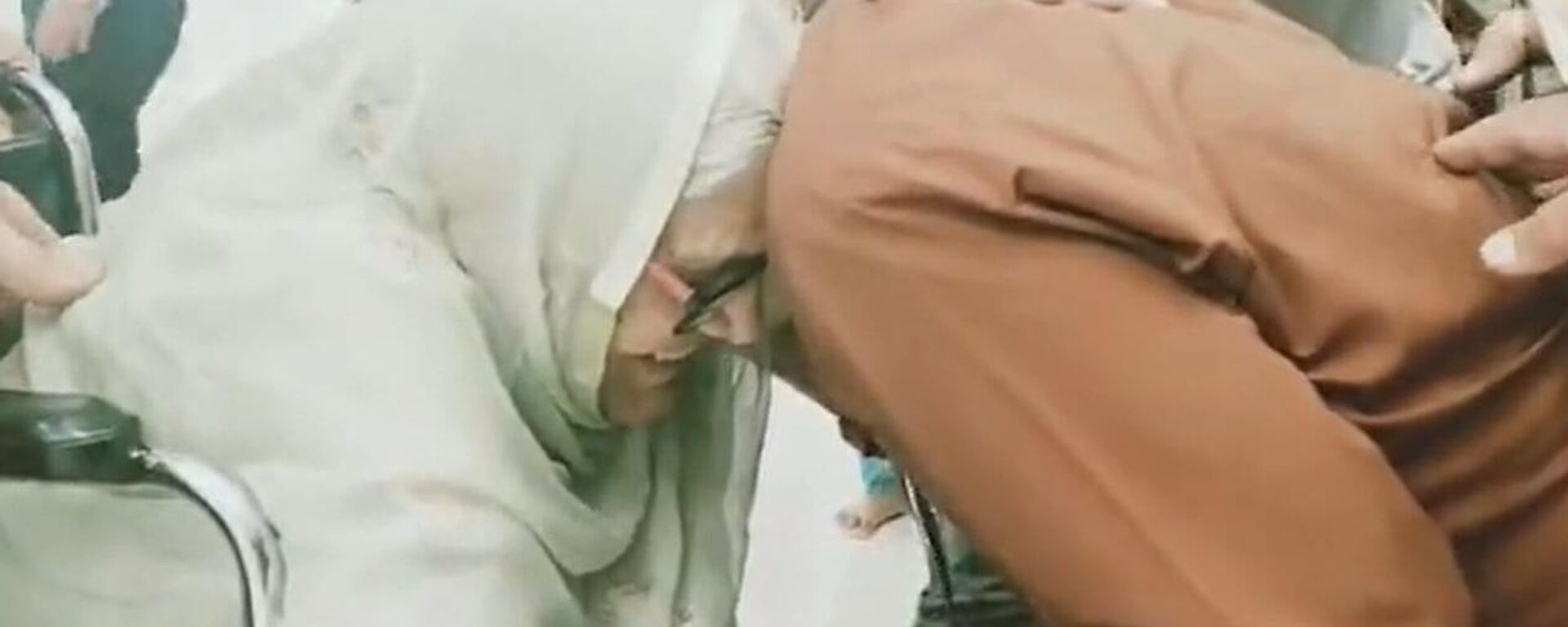https://sputniknews.in/20230814/historian-takes-look-back-on-partition-of-british-india-3584367.html
Historian Takes Look Back on Partition of British India
Historian Takes Look Back on Partition of British India
Sputnik India
British Barrister Cyril Radcliffe divided India into two sovereign nations -- India and Pakistan in 1947. But it led to a large scale rioting that reportedly killed 1 million people and displaced 15 million others.
2023-08-14T17:50+0530
2023-08-14T17:50+0530
2023-08-14T17:50+0530
sputnik opinion
partition of india
indian parliament
independence day
indian independence movement
india
delhi
new delhi
punjab
pakistan
https://cdn1.img.sputniknews.in/img/07e7/08/0e/3593322_0:72:3151:1844_1920x0_80_0_0_aa74d54bfc9c8fff002dc39e53c48199.jpg
India is preparing to commemorate the historic day it gained independence from the British Raj, a day after a separate nation was carved out of it following a painful partition.Dr. Harish Sharma, Professor (retd.), History Department, Guru Nanak Dev University, Punjab, known for his special interest in the colonial and post-colonial period of history of India, deliberated upon various aspects of the 1947 Partition in an interview with Sputnik India.Sputnik: What prompted the need to partition a country of millions just ahead of its independence from the British Raj?Prof. Sharma: It's not a simple question. Though I don’t think there was any need, I believe so, but then the circumstances were such that it had become unavoidable.Because particularly, Muhammad Ali Jinnah, the leader of the Muslim league, he was not agreeable to any plan which would keep India united.The solution to all the problems lied in the partition only. He was not agreeing to anything less than an independent state for the Muslims of India.So, the circumstances, I mean, had become such under which it was just not possible to avoid partition. So, it's not about the need, it was about circumstances.Sputnik: Was it the Indian political class, the British or the Hindu and Muslim communities who wanted the Partition?Prof. Sharma: During 1947 or even 1946, whatever was happening in India --the riots in Bengal, riots in Punjab, riots in other parts of India -- everybody wanted to get rid of that. And they were gruesome riots.So, nobody wanted to have that kind of a situation. And therefore it was much better to come out of it and the result was the Partition.Everybody seemed to be in a hurry at that time, be it the Muslim League, the Congress, the British -- everybody seemed to be in a hurry to finish with the things. And they did.In (India's undivided) Punjab province, the problem got aggravated when the Muslim League observed the Day of Deliverance on August 15, 1946. So, that day I think was a watershed moment in the history of India, when it was almost decided that they would not settle with any problem other than the partition.Sputnik: After over seven decades of partition, how do you look at the key purposes it has actually served?Prof. Sharma: This is quite obvious. Now you see, over the past 75-76 years India has progressed a lot. I mean, it's phenomenal progress. But, on the other side, that level of progress is not visible in Pakistan at all.The kind of problems that they are facing, the kind of prosperity that we are having now… if you look at this situation, we find that whatever has happened has happened with a cause.Sputnik: Does the partition of India look justified when you today look at the emotive standpoint of tens of thousands living on either side of the border?Prof. Sharma: This is a point which relates to the sentimentality of the people. By sentiments, yes they want to come here, see their lands and people.And people from this side also would like to go over to that side to see where their ancestors lived where their loved ones were killed or murdered or whatever the circumstances were. So that kind of feeling is still there.But then today if you ask any Indian who has his origins in the land of Pakistan or any Pakistani who has their origins in the present India, they wouldn’t like to migrate again.So, uprooting is a great emotional problem and then nobody would like to face that problem once again. So, that possibility is not there.Sputnik: Do you think history could be corrected some fine day?Prof. Sharma: In a historical process, things move forward. Things do not get back to the place from where they started off. History goes forward, it does not return backward.What happens for permanence, turns permanent. No change can happen in that and it's not possible as well. A map once changed cannot be fixed to its original form.This is supported by all historical events. Be it Europe or the Middle East, whatever changed there that cannot be returned to its original place. The same is applicable over here.
https://sputniknews.in/20230523/siblings-reunite-at-kartarpur-corridor-after-indian-partition-divided-them-75-years-ago-2113386.html
india
delhi
new delhi
punjab
pakistan
islamabad
middle east
europe
Sputnik India
feedback.hindi@sputniknews.com
+74956456601
MIA „Rossiya Segodnya“
2023
Sandeep Datta
https://cdn1.img.sputniknews.in/img/07e7/04/07/1468069_0:258:1800:2058_100x100_80_0_0_3909870b82375b0693e9fd27915facc3.jpg
Sandeep Datta
https://cdn1.img.sputniknews.in/img/07e7/04/07/1468069_0:258:1800:2058_100x100_80_0_0_3909870b82375b0693e9fd27915facc3.jpg
News
en_IN
Sputnik India
feedback.hindi@sputniknews.com
+74956456601
MIA „Rossiya Segodnya“
Sputnik India
feedback.hindi@sputniknews.com
+74956456601
MIA „Rossiya Segodnya“
Sandeep Datta
https://cdn1.img.sputniknews.in/img/07e7/04/07/1468069_0:258:1800:2058_100x100_80_0_0_3909870b82375b0693e9fd27915facc3.jpg
horrors of partition, partition horrors remembrance day, partition horrors remembrance day slogan, report on partition horrors remembrance day, who was responsible for the partition of india, how many hindu killed in 1947 partition, what were the consequences of the partition of india in 1947, why did partition of india happen, pakistan or the partition of india b.r.amedkar pdf, partition of india summary, essay on partition of india, causes and effects of partition of india, partition riots, partition riots in punjab, partition riots india, partition riots in bengal, partition riots in delhi, partition riots in lahore, communal riots during partition of india, what happened in the indian partition, history of partition of indiaindian partition, indian partition day, indian partition act 1893, indian partition act 1947, indian partition movies, indian partition literature, indian partition date, british rule in india, british rule period in india, cryril radcliffe partition, cyril john radcliffe , cyril radcliffe line,
horrors of partition, partition horrors remembrance day, partition horrors remembrance day slogan, report on partition horrors remembrance day, who was responsible for the partition of india, how many hindu killed in 1947 partition, what were the consequences of the partition of india in 1947, why did partition of india happen, pakistan or the partition of india b.r.amedkar pdf, partition of india summary, essay on partition of india, causes and effects of partition of india, partition riots, partition riots in punjab, partition riots india, partition riots in bengal, partition riots in delhi, partition riots in lahore, communal riots during partition of india, what happened in the indian partition, history of partition of indiaindian partition, indian partition day, indian partition act 1893, indian partition act 1947, indian partition movies, indian partition literature, indian partition date, british rule in india, british rule period in india, cryril radcliffe partition, cyril john radcliffe , cyril radcliffe line,
Historian Takes Look Back on Partition of British India
British Barrister Cyril Radcliffe divided India into two sovereign nations -- India and Pakistan in 1947. The move led to large-scale rioting that reportedly left a million people dead and displaced 15 million others.
India is preparing to commemorate the historic day it gained independence from the British Raj, a day after a separate nation was carved out of it following a painful partition.
Dr. Harish Sharma, Professor (retd.), History Department, Guru Nanak Dev University, Punjab, known for his special interest in the colonial and post-colonial period of history of India, deliberated upon various aspects of
the 1947 Partition in an interview with Sputnik India. Sputnik: What prompted the need to partition a country of millions just ahead of its independence from the British Raj?
Prof. Sharma: It's not a simple question. Though I don’t think there was any need, I believe so, but then the circumstances were such that it had become unavoidable.
Because particularly, Muhammad Ali Jinnah, the leader of the Muslim league, he was not agreeable to any plan which would keep India united.
The solution to all the problems lied in the partition only. He was not agreeing to anything less than an independent state for the
Muslims of India.
So, the circumstances, I mean, had become such under which it was just not possible to avoid partition. So, it's not about the need, it was about circumstances.
Sputnik: Was it the Indian political class, the British or the Hindu and Muslim communities who wanted the Partition?
Prof. Sharma: During 1947 or even 1946, whatever was happening in India --the riots in Bengal, riots in Punjab, riots in other parts of India -- everybody wanted to get rid of that. And they were gruesome riots.
So, nobody wanted to have that kind of a situation. And therefore it was much better to come out of it and the result was the Partition.
Everybody seemed to be in a hurry at that time, be it the Muslim League, the Congress, the British -- everybody seemed to be in a hurry to finish with the things. And they did.
In (India's undivided) Punjab province, the problem got aggravated when the Muslim League observed the Day of Deliverance on August 15, 1946. So, that day I think was a watershed moment in the history of India, when it was almost decided that they would not settle with any problem other than the partition.
Sputnik: After over seven decades of partition, how do you look at the key purposes it has actually served?
Prof. Sharma: This is quite obvious. Now you see, over the past 75-76 years
India has progressed a lot. I mean, it's phenomenal progress. But, on the other side, that level of progress is not visible in Pakistan at all.
The kind of problems that they are facing, the kind of prosperity that we are having now… if you look at this situation, we find that whatever has happened has happened with a cause.
Sputnik: Does the partition of India look justified when you today look at the emotive standpoint of tens of thousands living on either side of the border?
Prof. Sharma: This is a point which relates to the sentimentality of the people. By sentiments, yes they want to come here, see their lands and people.
And people from this side also would like to go over to that side to see where their ancestors lived where their loved ones were killed or murdered or whatever the circumstances were. So that kind of feeling is still there.
But then today if you ask any Indian who has his origins in the land of Pakistan or any Pakistani who has their origins in the present India, they wouldn’t like to migrate again.
Once a person was asked if there was a possibility of them coming back to their ancestral home, there was a classic reply: "We got uprooted once. But now, we would not like to get uprooted."
So, uprooting is a great emotional problem and then nobody would like to face that problem once again. So, that possibility is not there.
Sputnik: Do you think history could be corrected some fine day?
Prof. Sharma: In a historical process, things move forward. Things do not get back to the place from where they started off.
History goes forward, it does not return backward.
What happens for permanence, turns permanent. No change can happen in that and it's not possible as well. A map once changed cannot be fixed to its original form.
This is supported by all historical events. Be it Europe or the Middle East, whatever changed there that cannot be returned to its original place. The same is applicable over here.



